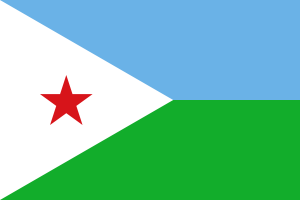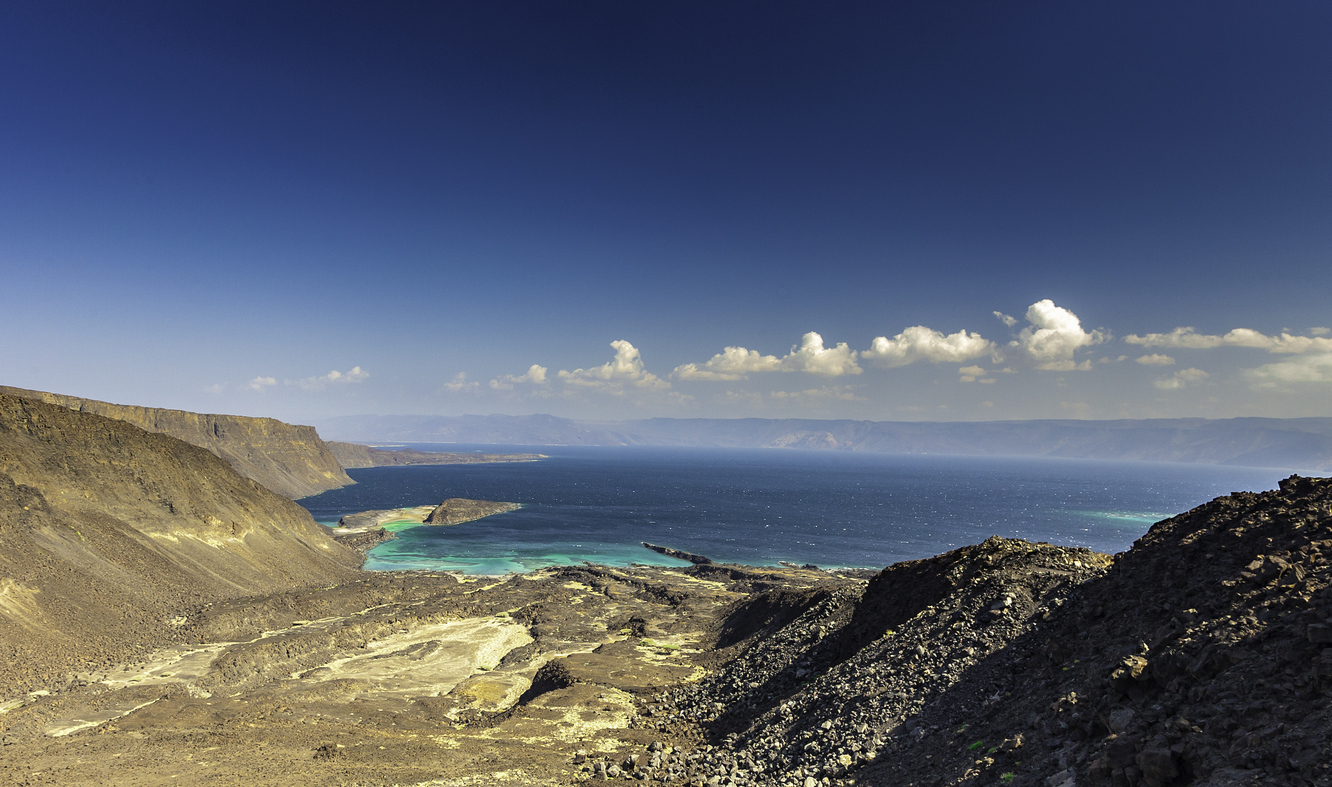Language/Afar/Culture/Djibouti-Timeline
Jump to navigation
Jump to search
Rate this lesson:
Historical Timeline for Djibouti - A chronology of key events
Djibouti Timeline[edit | edit source]
| Date | Event |
|---|---|
| 1493 BC AD | Egyptian expedition to the country of Punt, the first written testimony on the region of . |
| 1st millennium BC AD | First migrations of the Cushitic peoples. |
| 1st century-9th century | The kingdom of Axum controls the region. |
| 9th century | Implantation of Islam via Arab merchants. |
| 1520 | First reconnaissance of the coasts of the Horn of Africa by European sailors. |
| 1710 | First commercial agreement between France and the sultans of Tadjourah, with the aim of exporting Ethiopian coffee. |
| 1856 | Assassination of the French consul in Aden, in the Musha Islands. |
| 1862 | The French settle in Obock and make this small port the capital of the Obock colony and outbuildings. |
| November 1869 | The opening of the Suez Canal makes Bab el-Mandeb a highly strategic area. |
| 1885 | Following various treaties, France extends its influence from Doumeira to Somalia. |
| 1888-1892 | Obock is no longer the capital. The French settled in Ras Djibouti and created the port of Djibouti, more suitable for international trade. |
| 1896 | Léonce Lagarde becomes governor of the French Somali Coast, a new name for the French dependencies in the region. |
| 1898-1917 | Construction of the Djibouti - Addis Ababa railway, which makes Djibouti Ethiopia's commercial port. |
| 1926 | Sinking of the Fontainebleau and beginning of the extension of the port of Djibouti. |
| 1941-1943 | Djibouti comes under Vichy control. |
| 1943 | Djibouti joins forces with Free France. |
| 1946 | Djibouti receives the status of overseas territory; creation of an elected territorial assembly. |
| 1948 | Creation of the Djiboutian franc. |
| August 24, 1949 | Interethnic riots kill around 100 people. Rise of the desire for independence. |
| 1956 | Creation of a government council responsible, under the chairmanship of the head of the territory, for the management of local affairs. For the first time, all the representatives of the territory are indigenous. |
| 1967 | During a referendum, the population votes, by a small majority, in favor of the continuation of the management of the territory by France. The French Somali Coast becomes the French Territory of the Afars and the Issas. Closure of the Suez Canal following the Six Day War. |
| May 8, 1977 | The population overwhelmingly chooses independence (99%). |
| June 27, 1977 | Proclamation of independence. Hassan Gouled Aptidon becomes President of the Republic (reelected in 1981, 1987, 1993). |
| 1978-1980 | A terrible drought hits the region. |
| 1980s | Djibouti appears as an oasis of peace in the middle of a region which is being torn apart. |
| April 1992 | Boycott of the elections by the Front for the Restoration of Unity and Democracy (FRUD), a rebellion movement against the regime. |
| April 9, 1999 | Ismaël Omar Guelleh, president of the RPP (single party from 1981 to 1992) and nephew of Hassan Gouled Aptidon, becomes President of the Republic. |
| May 12, 2001 | Peace agreement between the government and FRUD. |
| 2002 | Installation of an American military base in Djibouti. |
| January 2003 | Legislative elections which see the victory of an alliance led by the RPP. Work begins on the port of Doraleh, which will double the country's port capacities. |
| April 8, 2005 | Re-election of Ismaël Omar Guelleh. |
| April 5, 2006 | A dhow carrying nearly 300 passengers (whereas it was planned for 80 people) and construction equipment turns over when it leaves the port of Djibouti. There are more than 100 dead, all of them Djibouti, the majority of the elderly who cannot swim. A major human disaster for the country. |
| June 10-13, 2008 | After a clash with the Eritrean army which had launched in pursuit of its deserters on Djiboutian territory, twelve Djiboutian soldiers were killed and sixty wounded. |
| February 2009 | Inauguration of the deep water port of Doraleh, managed by Dubai Port World. |
| April 2010 | Constitutional reform allowing President Ismaël Omar Guelleh to run for a third term. |
| February 2011 | Demonstrations against the economic situation and the power falling within the revolutionary context of the Arab world, repressed by the security forces (some deaths and several arrests). |
| April 8, 2011 | Re-election of Ismaël Omar Guelleh with more than 80% of the votes cast. |
| June 2011 | After forty-nine years of presence in Djibouti, the Foreign Legion leaves the country to settle in the United Arab Emirates. Installation of a Japanese base in Djibouti, the first permanent self-defense base abroad. |
| December 2011 | Signature of a defense cooperation treaty between France and Djibouti, which succeeds the defense agreement concluded during Djibouti's independence. |
| February 2012 | Municipal elections and victory for RADD (civil society). |
| September 2012 | Deployment of the European mission EUCAP Nestor to strengthen the fight against piracy in the region. |
| May 24, 2014 | A suicide attack claimed by the terrorist group Al-Shabaab takes place on a landAsse de café in Menelik Square. The balance sheet shows 3 dead (including the two terrorists) and around twenty wounded. |
| December 21, 2015 | Clash between the army and civilians during a traditional ceremony in Buldhoqo, on the outskirts of Djibouti-Ville. If the versions between the power in place and the opposition diverge, at least 7 deaths have been recorded. |
| March 18, 2016 | Four Djiboutian soldiers are released by Eritrea. They were taken prisoner in June 2008 during clashes at the border for control of the territory of Ras Doumeira, which Eritrea claims. |
| April 8, 2016 | Ismaïl Omar Guelleh was re-elected president in the first round of the presidential election with 86.68% of the vote. On May 8, he was officially invested for a 4th term. |
| May 24, 2017 | Inauguration of the new multipurpose port of Doraleh. It will be followed by the opening of new facilities in Tadjourah, the main town in northern Djibouti, and in Goubet. |
| July 12, 2017 | Installation of a Chinese military base in Djibouti, the first on the African continent. |
| August 2, 2017 | Death of the opponent Mohamed Ahmed aka "Jabha", member of the Front for the Restoration of Unity and Democracy (FRUD), detained since May 2010. |
| January 1, 2018 | Official commissioning of the new electrified railway line linking Djibouti to Addis Ababa, the Ethiopian capital, after several years of work. |
| February 23, 2018 | Legislative elections. The UMP, the party in power, obtains 88% of the votes. It remains dominant in the Assembly, with 57 seats of deputies. The UDJ-PDD coalition obtains 7 seats and the CDU only one. |
| March 11, 2019 | Visit of Emmanuel Macron to Djibouti. First presidential tour in the Horn of Africa. He is the second French president, after Nicolas Sarkozy in 2010, to go there for twenty years. |
Source[edit | edit source]
World Timelines[edit source]


